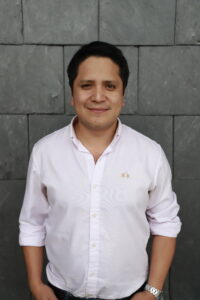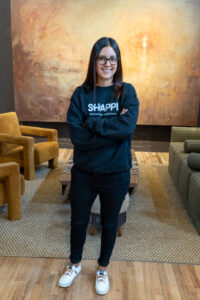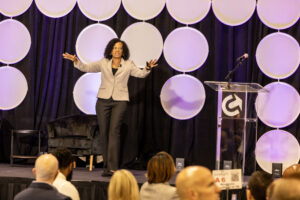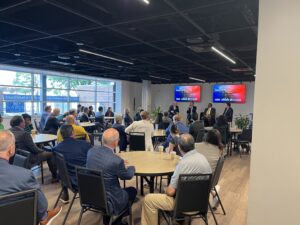The walls of Chattanooga Women’s Leadership Institute (CWLI) are painted with new possibilities for tomorrow’s decision-makers. Headquartered in downtown Chattanooga, the institute aims to change the world by creating more pathways to success for women – while keeping in mind that success is not defined by a single person.
Founded in 1996 by a core group of women leaders, the institute now serves over 600 members around Chattanooga — working to increase the leadership capabilities and influence of women. The institute aims to elevate more women into leadership positions across all community sectors including government, business and education.
The institute encourages all women to reach their highest potential, working from the premise that great leaders are built and not born. Moving beyond formal or technical education, candidates pass through a roughly five-to-seven-year leadership journey to join a network of over 3,000 professionals.

Kim Shumpert, CEO, CWLI, has held a passion for empowering women since childhood. She strived as a young girl to break the limits imposed on her mother’s generation. Leading the institute since 2018, she’s made it her mission to turn Chattanooga into the best place for women to work.
“Once you see things, you can’t unsee them,” Shumpert says. “I can’t abide watching strong female leaders, who are leaders in a domestic setting, not have those same opportunities in a compensated setting.”
Recently Shumpert served as a mentor for Protégé, a talent development program for early to mid-career professionals hosted by the Chattanooga Area Chamber of Commerce. During this session, Shumpert shared her insights into leadership and discussed finding the balance between personal and professional commitments.
Trend: How do you gauge the success of programs offered at CWLI? How do you know when to change directions?
Shumpert: What we have done for the past four years at CWLI is move away from the reputation of a women’s Rotary organization. When I first came on, we looked at our mission and asked, “What does being an institute mean? And why do we call ourselves an institute if we are predominantly doing networking events?”
We then set a strategic plan in place to become more than an institute. Among the outcomes we’re looking for, we want community members to look at women and say, “This is who we want for leadership.” We want to elevate more women into decision-making spaces. The pandemic revealed why we need more women in decision-making spaces.
We measure our outcomes by taking a member inventory. About 64% of our women hold a senior-level position within a corporate structure. Around 20% of our members are entrepreneurs. This is taken from a sampling of about 200 people, and we have over 600 people in our membership. Yet less than 2% of all the venture capital produced in a year goes toward women ideas. The question then becomes, how can we incubate and accelerate that work so women’s ideas are more successful? We survey our membership and develop our outcomes based off that survey.
That’s how we measure outcomes. And the main outcome we’re looking for is elevating more women into leadership roles.

Trend: Are there areas in which the pandemic has shifted the progress of women’s leadership in the workplace?
Shumpert: If you look at the job reports from January, you’ll notice that over 1 million men reengaged into the workforce versus 39,000 women. Women were disproportionately affected by the pandemic and we have not regained what was lost. Those gains are not expected to regain until at least 2024 or even longer. How can we expect there to be more women in decision-making spaces when we don’t even have enough women in the workforce right now?
Trend: One of the biggest demographics affected by the pandemic has been single mothers with children under the age of six, what can we do to close this disproportional gap?
Shumpert: There are a lot of creative solutions. More than just daycare, we need people who understand early childhood development.
When my daughter was young, I was a beneficiary of universal early childcare in Arkansas. As a community, we need to convene a commission of people to look at our resources differently. Businesses can offset the cost of childcare for their employees by creating matching programs similar to health savings accounts. The structure already exists within the framework for these programs.
If I as a business owner can offset some of the childcare expense, then I have a worker whose mind is free for productivity because her child is being cared for by a trained professional. It’s not an easy answer, but there are solutions we have not yet tapped into.

Trend: How do you build strategic relations on behalf of CWLI? Being such a public figure, how do you differentiate those professional relationships from your personal relationships?
Shumpert: By understanding that yes is yes, and no is no. I don’t always do a great job of that, but I really try. I can’t be one person in public that I am not in private. I have to be that person across all spectrums of my life. It’s too hard to be a performer in one space and something different somewhere else.
My professional relationships and personal relationships have to align around my top three values — integrity, honesty and family. Recently, I was asked to do something outside of one of those values and I had to push back. I had to walk that person through the real desired outcome and say, “I can’t do this one thing you are asking, and I am sorry.” But the next time I see that person my relationship is intact because I know what I did was aligned with my values.
Trend: How do you balance your professional commitments with family time?
Shumpert: In this space, it’s really good to have what I call a personal board of directors. My husband serves as the chair of that particular board. We’ve been back in Chattanooga for six years and this whole time I can say I’ve never wanted for any social activity. But getting those deep meaningful conversations and deep meaningful commitments out of people takes time. When you ask someone to be vulnerable with you, you need to make sure you reward and reinforce that vulnerability with them, so the relationship is cemented. It’s not always just about the volumes of experiences you have with people. It’s who you are choosing to have quality and meaningful relationships with and finding ways to be mutually rewarding.
In a professional setting, I look to see what skills you need that I am uniquely qualified for, to ensure my time is valued. I do that with everybody that wants to be on our board as well. I look to see what skills we need and who can fill that role.

While there are many professional women’s organizations throughout the country, Chattanooga Women’s Leadership Institute differentiates itself by going beyond education to create a transformative space where women can succeed.
A candidate may enter the program in one of 12 study courses across three experience levels – beginning, middle or advanced. Then, a candidate may decide to advance toward more intense development courses called Leadership Tracks. These courses are designed to challenge a candidate’s leadership parameters, advancing them toward a higher role.
Though candidates may also choose to stay at the surface level by taking part in the many networking events offered, the institute encourages each member to push herself within the program – eventually mentoring the next generation of aspiring entrepreneurs.
As part of its mission to provide transformative environments for female professionals, CWLI launched the Legacy Center – a designated space for women looking to work, connect and grow. As Chamber members themselves, CWLI opened the Legacy Center inside the Chamber of Commerce building on 811 Broad Street. Designed with the goal of empowering women in the workplace, the Legacy Center features a wide range of amenities including large and small conference rooms, dedicated workstations and a nursery room.
Learn more about the Chattanooga Women’s Leadership Institute at cwli.org.








